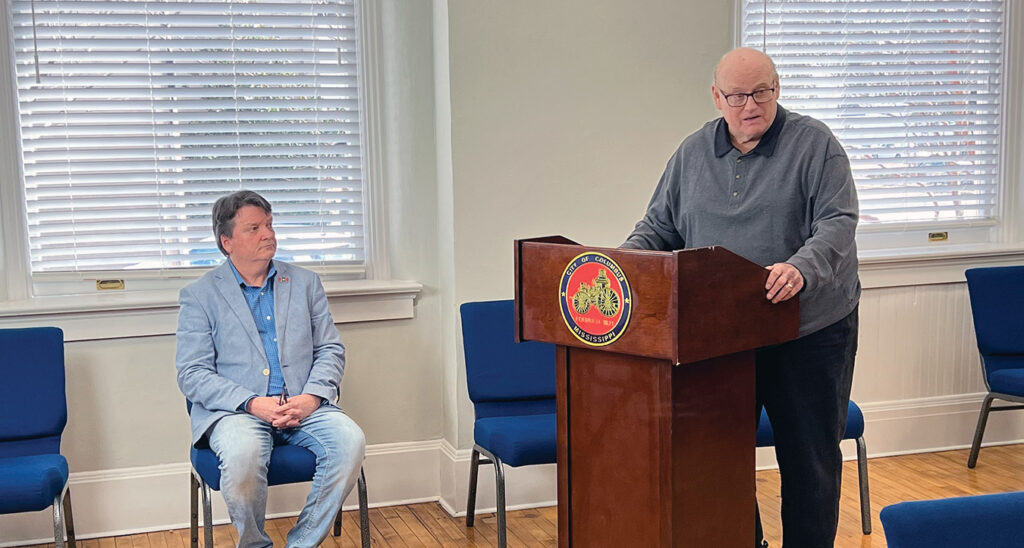In the wake of a devastating Fiscal Year 2020 audit report, Chief Financial Officer James Brigham said at a Wednesday press conference the city is already working to correct the problems, estimating it would take about six months to get it all under control.
Wanda Holley, of the Watkins, Ward and Stafford accounting firm, delivered the audit report on Tuesday, which covered the fiscal year ending Sept. 30, 2020. State law required it be finished a year after that, and federal law mandated it be done by Dec. 30, 2021, but difficulties gathering correct information for the audit pushed the report more than a year past those deadlines.
After Holley’s presentation, the council voted to table it to give themselves more time to digest the 100-page-plus report.
The audit report included findings laying out deficiencies ranging from failure to reconcile bank accounts, failure to document transfers of funds between accounts, poor controls over federal grant dollars and recurring problems with fixed asset inventories and record-keeping at the landfill.
Among the most significant findings was that the city overspent its 2020 general fund budget by more than $3.2 million, largely due to failure to amend the budget and reconcile bank statements.

“The state is very clear that when you set a budget, you either stay at that or below it,” Brigham said. “You can do a budget amendment, so for example if the revenue is higher than expected you can spend more money, but you have to go back and do an amendment.”
All of this happened when Deliah Vaughn was CFO. She was hired in May 2019 in the wake of the arrest of former CFO Milton Rawle for embezzlement of about $300,000 over several years. She resigned in September 2021 to take a job with the city of West Point.
The city has its arms around the 2022 and 2023 finances, Brigham said, and that mistake will not be repeated.
“We’re reconciling the bank accounts on a monthly basis now and we’re following the budgets,” he said.
Still, some issues need to be addressed, including repeat audit offenses for not having an adequate ledger for fixed assets and problems tracking revenue at the landfill.
“We have addressed the fixed asset inventory,” he said. “We have tagged our assets, and we need to create the appropriate ledgers so we can do the depreciation on a timely basis, and we need to make sure when we buy an asset it goes on the books and when we sell one it goes off. It’s not much more complicated than that.”
The landfill needs an accounts receivable system, he said.
“We need a system to know how old all the bills are,” he said. “… We need a reconciliation between who uses the landfill and who’s paying for it.”
Brigham was careful to say he didn’t believe there was wrongdoing.
“There is no evidence the landfill is not being properly handled,” he said.
Properly handling court collections “continues to be a challenge,” Brigham said. The city uses two systems to manage fine collection, one of which exclusively deals with credit cards and tracks associated card fees.
“One of them reconciles daily, and the other was supposed to (but did not),” he said. “We’ll be fixing that shortly, and probably end up with just one system.”
Federal programs
The city’s inability to document how federal disaster relief dollars were spent in the wake of the February 2019 tornado was one of the primary delays in getting this audit prepared, officials have told The Dispatch in the past. The audit report dinged the city for circumventing state purchasing law by producing invoices that avoided the bidding process for that work.
The city was also cited for not keeping a proper accounting of other federal programs.
Brigham, for his part, recommended a director of federal programs position within the city to manage federal grants going forward.
“It is absolutely my recommendation that somebody pulls this all together as one portfolio,” he said. “I don’t know if we need it long-term, but right now we’ll have somewhere between $5 million and $10 million that needs to be handled correctly, and that’s a day-to-day responsibility.”
Brigham was referring to the city’s federal American Rescue Plan Act funding, which includes a $3 million for blight remediation as well as at least $3 million for watershed issues.
“In the past we’ve had too many cooks in the kitchen,” Brigham said.
Interim City Planner George Irby was director of federal programs when he was full-time but worked mostly with home improvement and blight-related programs while others, including Public Information Officer Joe Dillon, handled FEMA grants.
Council reaction
Ward 3 Councilman Rusty Greene told The Dispatch Wednesday afternoon he expected the 2020 audit to be bad.

“I think we went through some years of mismanagement and not having the right people in the right place doing the right things,” he said. “… It was a mess, but I think we’re on the right track to get back to where we need to be.”
Greene also thought the fallout from Rawle’s embezzlement was to blame for the crisis developing.
“We had one CFO embezzle money, and obviously the books weren’t run the way they were supposed to be run,” he said. “It’s just unfortunate that he was in a position to do that, and maybe we didn’t have the safeguards in place to keep it from happening.”
Ward 5 Councilman Stephen Jones said the audit wasn’t as bad as it could have been.

“I haven’t had time to look over it for myself,” he said. “But based on what (Holley) said it wasn’t as bad as most people were thinking it was going to be.”
Jones said he thought the problems were caused in part because of the chaos in the city at the time.
“I think a lot of it was that it was a rough time back then,” he said. “We were coming off a tornado, the COVID-19 pandemic had just started, we were faced with a lot of difficult decisions. A lot of it was things we couldn’t plan for that were happening.”
Jones said the bottom line for him was that all money was accounted for.
“At the end of the day the most important thing for me was that no money was missing and everything was accounted for,” he said. “We’re moving forward now, and hopefully we have a handle on everything and are making better decisions.”
Ward 1 Councilwoman Ethel Stewart, Ward 2 Councilman Joseph Mickens, Ward 4 Councilman Pierre Beard and Ward 6 Councilwoman Jacqueline DiCicco did not respond to requests for comment by press time.
Brian Jones is the local government reporter for Columbus and Lowndes County.
You can help your community
Quality, in-depth journalism is essential to a healthy community. The Dispatch brings you the most complete reporting and insightful commentary in the Golden Triangle, but we need your help to continue our efforts. In the past week, our reporters have posted 51 articles to cdispatch.com. Please consider subscribing to our website for only $2.30 per week to help support local journalism and our community.




